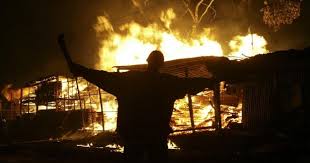By Tobias Ogutu
Government offices are established to provide services to citizens. These offices are maintained through the taxes paid by the public. Similarly, government vehicles and other properties are intended to support the delivery of better services to the people. The most commonly recognized government office is usually that of the chief responsible for serving the community. However, some officeholders treat these offices as their private property, deciding arbitrarily whom to welcome and whom to exclude. This issue is evident in Nyalenda A in Kisumu East Sub-County, as well as in Obunga in Kisumu Central Sub-County.
When I visited a public gathering in Obunga, I noticed that some of the problems they faced were similar to those experienced by residents of Nyalenda. One prominent issue was the misuse of office by local chiefs. In Nyalenda A, you might wake up early, hoping to meet the chief for various services, such as signing documents for school bursaries or National Identification Card application forms, but your day often ends in disappointment.
First of all, the chief does not report to the office on time. Most government offices open at 8:30 a.m., but the chief typically arrives around 11:00 a.m. The purpose of arriving early is to secure a priority booking to meet the chief first upon arrival. This behavior of local chiefs who live within walking distance of their offices yet consistently report late, is widespread in both Nyalenda A and Obunga. Unfortunately, the residents’ complaints have never been addressed.
Secondly, after arriving late, the chiefs tend to serve people they know first, without considering who arrived earlier. This abuse of office is common among Chiefs in Obunga, Manyatta A, and Nyalenda A. The chief does not care how long you have been waiting; he or she will call those known to him by name inside and serve them first. Those unknown to the chief must wait outside, hoping he or she does not become hungry, because if that happens, the chief will leave for lunch and may return at the same time the next day.
The government may believe that citizens receive good services at the local level because they maintain the office of the chiefs. However, for the residents of Nyalenda A, Obunga, and Manyatta A, obtaining services from their chief is as difficult as finding an oasis in a desert. The agency responsible for monitoring and evaluating the chiefs or administrative officers should treat this as an urgent issue and address it promptly.






